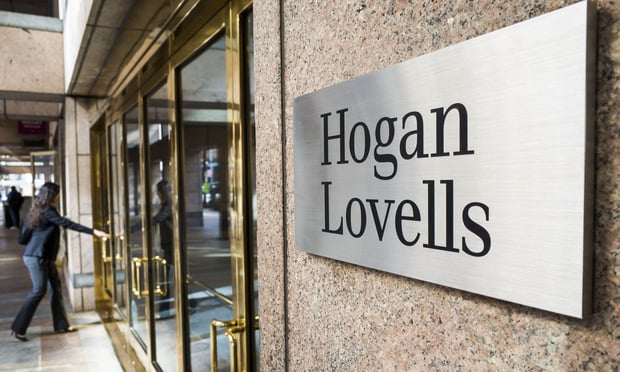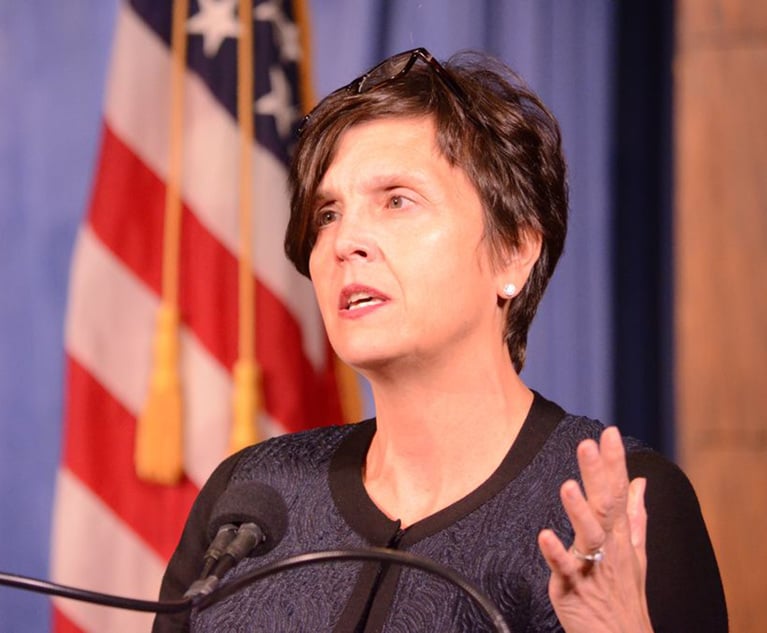Hogan Lovells Argues States, Not Feds, Should Hold Executions in Fight Over Barr's Death Penalty Policy
Justice Department attorney Melissa Patterson urged the three-judge panel to lift a trial court's injunction, noting that three justices indicated they would side with the government.
January 15, 2020 at 01:27 PM
4 minute read
 Hogan Lovells office in Washington, D.C. (Photo: Diego M. Radzinschi / ALM)
Hogan Lovells office in Washington, D.C. (Photo: Diego M. Radzinschi / ALM)
A flood of Big Law and Justice Department lawyers took over the U.S. Court of Appeals for the D.C. Circuit on Wednesday, as they argued over Attorney General William Barr's new policy reviving the federal death penalty.
U.S. District Judge Tanya Chutkan ruled late last year to block several federal executions scheduled to begin in December under the new policy. The D.C. Circuit and the U.S. Supreme Court both declined to stay that order while the appeal was litigated.
Justice Department attorney Melissa Patterson urged the three-judge panel to lift Chutkan's injunction, noting that a statement signed by Justices Samuel Alito, Neil Gorsuch and Brett Kavanaugh indicates they believe the federal government will win the case.
She said the case turns on the reading of the word "manner" within federal death penalty law, arguing that term applies solely to the method of execution, and not other issues like the substance used for a lethal injection or the location of an execution.
Wednesday's panel—comprised of Judges David Tatel, Neomi Rao and Gregory Katsas—questioned the law on executions, the Federal Death Penalty Act and what responsibilities it hands to federal and state governments.
Tatel noted the act directly gives some powers to the attorney general but does not address others.
"How can a statute that gives a federal official three express responsibilities," Tatel asked, be interpreted to let that officials fill in the rest of the gaps during an execution?
Arguing on behalf of the four men whose executions are currently blocked was Catherine Stetson, co-head of Hogan Lovells' appellate practice group.
Stetson told the panel that the federal death penalty law blocked the creation of a national policy for executions and that executions should be left to the states.
She noted that Congress had turned to the states to lead execution policies because their protocols were considered "more humane" than those used at the federal level and that the new policy therefore should not be upheld.
The panel of judges did not explicitly signal how they'll rule on the policy. But the panel's makeup, which consists of two judges appointed by Donald Trump, Katsas and Rao, puts the president's judicial nominees at the heart of a decision on a major administration policy.
The case has also drawn a number of Big Law attorneys to the D.C. Circuit. Stetson, alongside fellow Hogan Lovells partner Pieter Van Tol, is representing inmate Daniel Lewis Lee.
Attorneys from Wilmer Cutler Pickering Hale and Dorr are representing another inmate, Wesley Ira Purka, and KaiserDillon attorney Jonathan Jeffress is on board to defend Dustin Lee Honken. Federal public defender Shawn Nolan is representing Alfred Bourgeois.
The line for parties in the case stretched far longer than the lines for the press or the public waiting to enter the courtroom ahead of arguments Wednesday morning. And after arguments, a couple of dozen attorneys, including Stetson, could be seen huddling in the courthouse cafeteria.
Chutkan wrote in her November opinion that, "absent a preliminary injunction, Plaintiffs would be unable to pursue their claims, including the claim that the 2019 protocol lacks statutory authority, and would therefore be executed under a procedure that may well be unlawful."
Alito, Gorsuch and Kavanaugh urged the appeals court to act quickly after the Supreme Court denied to pause Chutkan's order.
"The Government has shown that it is very likely to prevail when this question is ultimately decided," Alito wrote at the time, adding, "in light of what is at stake, it would be preferable for the District Court's decision to be reviewed on the merits by the Court of Appeals for the District of Columbia Circuit before the executions are carried out."
Wednesday's arguments stem from a years-old case originally playing out in district court. That challenge to the federal death penalty was paused after the executive branch stopped executions but was revived when Attorney General William Barr announced that the agency would restart the practice.
Read more:
DOJ's New Death Penalty Protocol Already Landed in Federal Court
Kavanaugh Leads Majority Ruling for Mississippi Death Row Inmate
Justices' Feud Over Death Penalty Flares, Exposing Tension and Private Deliberations
Gorsuch's 'Troubling Dicta' in Death Case Draws Sotomayor Rebuke
This content has been archived. It is available through our partners, LexisNexis® and Bloomberg Law.
To view this content, please continue to their sites.
Not a Lexis Subscriber?
Subscribe Now
Not a Bloomberg Law Subscriber?
Subscribe Now
NOT FOR REPRINT
© 2025 ALM Global, LLC, All Rights Reserved. Request academic re-use from www.copyright.com. All other uses, submit a request to [email protected]. For more information visit Asset & Logo Licensing.
You Might Like
View All
Skadden and Steptoe, Defending Amex GBT, Blasts Biden DOJ's Antitrust Lawsuit Over Merger Proposal
4 minute read
'Lack of Independence' or 'Tethered to the Law'? Witnesses Speak on Bondi
4 minute read
Law Firms Mentioned
Trending Stories
- 1SDNY Criminal Division Deputy Chief Returns to Debevoise
- 2Brownstein Adds Former Interior Secretary, Offering 'Strategic Counsel' During New Trump Term
- 3Tragedy on I-95: Florida Lawsuit Against Horizon Freight System Could Set New Precedent in Crash Cases
- 4Weil, Loading Up on More Regulatory Talent, Adds SEC Asset Management Co-Chief
- 5Big Banks Did Great Last Year. What Does That Mean for Big Law?
Who Got The Work
J. Brugh Lower of Gibbons has entered an appearance for industrial equipment supplier Devco Corporation in a pending trademark infringement lawsuit. The suit, accusing the defendant of selling knock-off Graco products, was filed Dec. 18 in New Jersey District Court by Rivkin Radler on behalf of Graco Inc. and Graco Minnesota. The case, assigned to U.S. District Judge Zahid N. Quraishi, is 3:24-cv-11294, Graco Inc. et al v. Devco Corporation.
Who Got The Work
Rebecca Maller-Stein and Kent A. Yalowitz of Arnold & Porter Kaye Scholer have entered their appearances for Hanaco Venture Capital and its executives, Lior Prosor and David Frankel, in a pending securities lawsuit. The action, filed on Dec. 24 in New York Southern District Court by Zell, Aron & Co. on behalf of Goldeneye Advisors, accuses the defendants of negligently and fraudulently managing the plaintiff's $1 million investment. The case, assigned to U.S. District Judge Vernon S. Broderick, is 1:24-cv-09918, Goldeneye Advisors, LLC v. Hanaco Venture Capital, Ltd. et al.
Who Got The Work
Attorneys from A&O Shearman has stepped in as defense counsel for Toronto-Dominion Bank and other defendants in a pending securities class action. The suit, filed Dec. 11 in New York Southern District Court by Bleichmar Fonti & Auld, accuses the defendants of concealing the bank's 'pervasive' deficiencies in regards to its compliance with the Bank Secrecy Act and the quality of its anti-money laundering controls. The case, assigned to U.S. District Judge Arun Subramanian, is 1:24-cv-09445, Gonzalez v. The Toronto-Dominion Bank et al.
Who Got The Work
Crown Castle International, a Pennsylvania company providing shared communications infrastructure, has turned to Luke D. Wolf of Gordon Rees Scully Mansukhani to fend off a pending breach-of-contract lawsuit. The court action, filed Nov. 25 in Michigan Eastern District Court by Hooper Hathaway PC on behalf of The Town Residences LLC, accuses Crown Castle of failing to transfer approximately $30,000 in utility payments from T-Mobile in breach of a roof-top lease and assignment agreement. The case, assigned to U.S. District Judge Susan K. Declercq, is 2:24-cv-13131, The Town Residences LLC v. T-Mobile US, Inc. et al.
Who Got The Work
Wilfred P. Coronato and Daniel M. Schwartz of McCarter & English have stepped in as defense counsel to Electrolux Home Products Inc. in a pending product liability lawsuit. The court action, filed Nov. 26 in New York Eastern District Court by Poulos Lopiccolo PC and Nagel Rice LLP on behalf of David Stern, alleges that the defendant's refrigerators’ drawers and shelving repeatedly break and fall apart within months after purchase. The case, assigned to U.S. District Judge Joan M. Azrack, is 2:24-cv-08204, Stern v. Electrolux Home Products, Inc.
Featured Firms
Law Offices of Gary Martin Hays & Associates, P.C.
(470) 294-1674
Law Offices of Mark E. Salomone
(857) 444-6468
Smith & Hassler
(713) 739-1250











